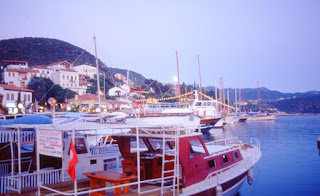As for the reason why I went to the trouble: A 1991 Italian film called Mediterraneo won the Academy Award for Best Foreign Film. The film tells of 8 bumbling, misfit Italian soldiers who landed to secure a Greek island called Megisti, another name for Kastelórizo, in 1941. When their supply ship was sunk, and they destroyed their radio by accident, they were stranded. The villagers who were in hiding at their arrival reappeared. They were the women and children left behind after the Germans had taken the men away for forced labour. Forgotten by their navy, the Italians settled into the idyllic life of the island, finding paradise on earth.
Breakfast had touches for the German guests: oats with raisins, yoghurt, cheese, orange juice, and coffee instead of tea. At the tour office I met the other people for the excursion, an elderly US couple, J and E. He was a furniture craftsman, and she an education researcher. At 1100 we went to the police station to get our day pass for Greece. There we met two British women, R and L, who were doing the trip to get their visa renewed for Turkey. They were surprised we were doing this day trip. Natashas (Russian prostitutes) also used this loophole until the Turkish authorities closed it. The formalities took ages. The tour guide told us that after the success of the film, many Italian tourists came to the island, but their numbers had dwindled in recent years.
Gabriele Salvatores' genius was to dramatise the tale with a cross-section of personalities we can identify with. Montini, the lieutenant, a Sunday painter with an artistic bent, is calm and somewhat detached from the tumult around him. Farina, his orderly, is shy. Lo Russo, the sergeant, is gung-ho and eager to accomplish. The village priest is old and wise and has seen it all before. Salvatores does not fall into the traps of oversentimentality or ponderousness, but propels the story briskly.
L was pretty and I could not help stealing glances at her during the crossing. But I detected no laughter in her voice. It felt a bit like talking with a born-again Christian zombie. She said that she had been a consultant, hated her job and gave up everything to live in Greece. R was a freelance journalist and paid by the piece. She sounded cynical. Did living in Britain make them world-weary? R gave me the tip that Olimpos, near Antalya, was worth visiting.
We cruised into the familiar U-shaped harbour prominent in the film. We only had a few hours to explore. The tour office thought that the Greek authorities were uncooperative, but I think the boat captain was not displeased to have a shorter excursion.
In the film a Turkish trader comes over to the island, plies the soldiers with hashish in an evening of dope fueled laughter, and steals away in the dawn with their valuables and weapons. This was totally feasible as the island is only 2 km off the Turkish coast.
During their 3 years of enforced isolation, Italy had changed sides in WWII, and the Germans had been pushed back to the north. Eventually the soldiers were repatriated by the British. Farina however hid at the departure to remain with the local woman he had fallen in love with and married, the former town prostitute. I watched the film again recently and I realised that my memory had played tricks with me. It was not the lieutenant, Montini, but rather the sergeant, Lo Russo, who had found Farina, and turned a blind eye to his desertion.
The island looked exactly as I had envisaged. It was sleepy in the still air and noon heat. I missed the cooling breezes of Datça. Was it the sheltered harbour, the wrong part of the Mediterranean or what? The USAns and I found a taverna and had a lunch of moussaka. The meal was good but pricier than in Turkey.
After lunch we walked up to high ground and viewed the glorious turquoise water. Here is the Mediterranean of your dreams, I said to J and E. That saturated colour sticks in my mind after all those years.
In a poignant coda to the story, decades after the war an aged Montini visits Farina, now a widower. To his surprise, he finds Lo Russo living with Farina. They share a drink. Life wasn't so good in Italy, they didn't let us change anything, said Lo Russo, and so I came here. Lo Russo is like us at times, disappointed with life. The foreword to the film is a phrase by Henri Laborit: In times like these, escape is the only way to stay alive and keep dreaming. The final dedication of the film is to all those who are running away.
The film, light-hearted though it is with its theme of make love not war, asks all of us the question of how much we owe to society and when must we follow our instincts and drop out. In a Zen-like conclusion, Montini reaches for an eggplant and a paring knife and says I'll give you a hand. Perhaps it is through immersion in life that true escape lies. Perhaps, as Kazantzakis wrote in Zorba the Greek, devotion to an ideal is only relative freedom: the higher the model, the longer the tether of our slavery.
In the evening I found a lokanta with a garden (bahçe) and had chicken broth for dinner. After the desertedness of Kastelórizo, Kaş felt like a normal family town with kids playing.
It was a satisfying day. The excursion was relatively expensive, but I was glad that I had seen the place for myself. I also knew that I had to leave behind on the island any escapist fantasies. True escape is in one's mind.









No comments:
Post a Comment